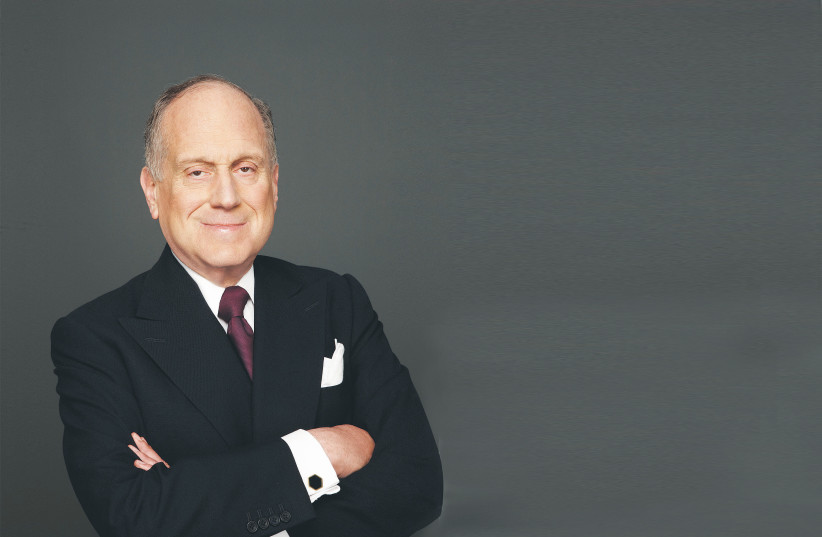It’s a sad fact of life that it’s harder to sell peace and tolerance in our world than terror, death and destruction, especially in the global press.
The war in Ukraine has dominated the headlines over the past weeks. Now, the terrible new wave of terror that has killed innocent victims in Hadera, Beersheba and Bnei Brak has changed the focus in the Middle East. In my country, sadly, bad behavior at Hollywood’s Oscars has even overshadowed the killings in Israel.
So, you would have to really hunt to find any news in America, of the meetings that just took place in the Negev Desert, the Negev Summit.
That is a shame because they are significant and historic. Last week, for those who missed it, the foreign ministers of Bahrain, Egypt, Morocco, the UAE, the United States and Israel came together in an extraordinary summit at Sde Boker, in the Negev Desert of Israel.
If you ever wanted to see the black-and-white contrast between the bridge builders of peace in our world and those who want to destroy, it all took place right there in front of our eyes.

The mere fact that these high-ranking officials gathered in Israel is breathtaking. And the fact that all of them in unison condemned the deadly attacks is heartening. On the other side of the world divide between good and evil, Hamas, Islamic Jihad and Hezbollah (an Iranian proxy) congratulated the attackers.
This is the clash our world is facing: The clash between bridge builders and those who use terror and fear in order to divide us for their own warped goals. There is something else that is important, and it should not be missed.
It is now apparent that all of these nations that have established a relationship with Israel, share the same enemies in the region, namely the terrorist groups some in the name of Sunni or Shia ideologies. Therefore, the Negev Summit and before that, the trilateral summit in Sharm e-Sheikh, attended by Egyptian President Abdel Fattah al-Sisi, Abu Dhabi Crown Prince of Abu Dhabi Mohammed bin Zayed and Prime Minister Naftali Bennett are as important as they are unprecedented.
They reinforce the previous Abraham Accord peace agreements, and they lay the ground for an even wider alliance, between most of the Arab nations, the State of Israel and perhaps even Turkey. The seemingly elusive dream of a New Middle East seems to no longer be just a dream, even though you have to hunt to find it in most newspapers.
All of this came about for two reasons. The fear of Iran’s growing influence in the region — and its potential access to nuclear weapons, if the new deal being pushed by the United States and Europe comes about — prompted both Jews and Sunnis to join forces to confront the radical Shiite threat. Also, a deep disappointment with America’s semi-isolationist policies is driving moderate Arab leaders to discern that their only truly trustworthy ally is their small, but mighty neighbor — Israel.
This has led to full diplomatic relations, free trade agreements, direct flights, burgeoning tourism, and ambitious economic initiatives between Israel and its Gulf neighbors, creating a formidable new regional structure, rising before our very eyes. Also, accelerated intelligence and security cooperation measures form the foundations of this impressive new network.
And yet, the exceptional achievements of the Sharm e-Sheikh and Negev Summit have still not brought two crucial players for peace to the table: Saudi Arabia and the Palestinian Authority.
This is regrettable. Without the economic and strategic might of the oil-rich Kingdom, and without the entity that represents the Palestinian people, any Arab-Israeli peace accord is incomplete.
This is the reason Israel, Bahrain, Morocco, the UAE, Jordan and Egypt together with the United States must strive to amplify the bold initiative they have already launched.
The US and Israel must become active partners in a regional defense alliance that will provide the moderate Arab world with a strategic Iron Dome; Saudi Arabia, the UAE, Bahrain, Morocco and other Arab nations should become active partners in mitigating the Israeli-Palestinian conflict and preventing a One-State catastrophe; and the American-Arab-Israeli alliance should work together to prevent Iran’s nuclearization and safeguard the West’s energy security in light of the uncertainty caused by Russia’s invasion of Ukraine.
This may sound like a utopian vision, but it’s not. Anwar Sadat, Menahem Begin, Yitzhak Rabin, Shimon Peres and King Hussein were true visionaries: they dared to dream of peace when the Middle East was marked by daily bloodshed. And they left the world better and safer, not poorer and more dangerous, with their courageous lives.
Now seeing the foreign ministers of Egypt, the UAE, Bahrain and Morocco standing together with the US Secretary of State in Israel, brings back the hope that peace is possible. It should not, and must not, be squandered.
